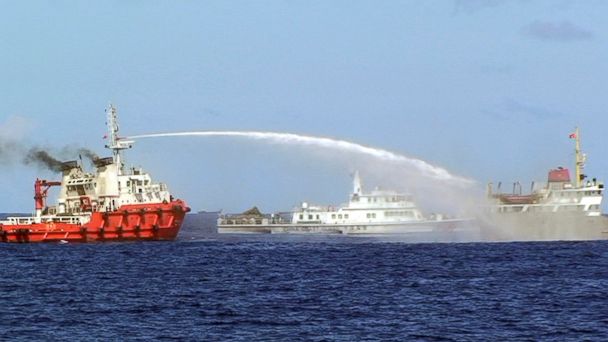China/Vietnam Flare-Up Could Knock Obama's Asia Strategy Off Balance

A Chinese ship, left, shoots water cannon at a Vietnamese vessel, right, while a Chinese Coast Guard ship, center, sails alongside in the South China Sea, off Vietnam's coast, May 7, 2014. Vietnam Coast Guard/AP Photo
Flare-ups between China and Vietnam in the South China Sea, in which both sides have fired water cannons and sparked protests back on shore, are a test for the Obama administration's Asia policy, as it balances the desire for good relations with China with the need to support smaller countries in the region, experts said.
Since China stirred tensions on May 1 by putting an oil rig into waters not far from the disputed Paracel Islands, which both China and Vietnam claim, the United States has issued several statements calling for calm on both sides.
Secretary of State John Kerry called his Chinese counterpart Wang Yi on Monday, condemning China's "provocative" decision to introduce the rig and other government vessels into the disputed territory.
But the United States faces a conundrum even by weighing in on the situation, several Asia experts said, noting that the administration wants to build stronger ties in the region, but doesn't want to risk antagonizing China.
Abe Denmark, vice president at the National Bureau of Asian Research, said that if tensions persist, other countries in the area like the Philippines and South Korea, which have their own territorial issues with China, might look to the United States to intervene.
"They're worried about maintaining their own territorial integrity and their own sovereignty and they see the United States as the only country that can balance a rising China," he said.
In fact, when he visited the Philippines at the end of April, President Obama signed a new defense agreement with the Manila government that increases opportunities for the U.S. to train Philippine forces and boosts its Coast Guard and police force.
China views the United States' so-called "rebalance" to Asia as a potential threat, believing its focus in the region is encouraging China's smaller neighbors to stand up to it, Denmark said.
One of China's top generals, Fang Fenghui, accused the United States of doing just that when he visited the Pentagon Thursday, saying the United States "stirred up some of the problems which actually [made] the South China Sea and East China Sea not so calm as before."
Regardless of their size, all countries in the region view the "rebalance" against the backdrop of their own interests, Michael Auslin, an Asia expert at the American Enterprise Institute, said.
"Each nation has read in to the rebalance something they want to," he said.
Limiting the Obama administration's response to paper statements and phone calls allows the U.S. to show it's not going to play full-time peacekeeper in the region, Auslin said. But at the same time, he added, giving China too much leeway could be dangerous.
"It's shouldn't be our job to send in the Seventh Fleet every time a nation, including a treaty partner, has some sort of flare-up or disagreement with China. On the other hand, what we're seeing is a very steady, very continuous undercutting of international law and norms," he said.
Bonnie Glaser, an Asia expert at the Center for Strategic and International Studies, said it's important to keep the situation from escalating.
"They want to see differences resolved peacefully through dialogue. That would be a good outcome for the U.S.," she said.
Auslin advocated placing U.S. ships around the disputed areas, given that they're already moving back and forth through the South China Sea.
"To simply have ships in the area a little more often, that doesn't seem to me to be particularly provocative but it sends a message," he said.
But, he noted, the administration might be too concerned such a move could stoke the ire of the Chinese.
"I think the U.S. is afraid it's provocative. But we also have been in a way tamed by the Chinese to be very sensitive to that."